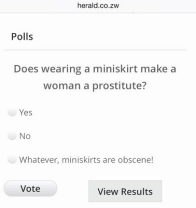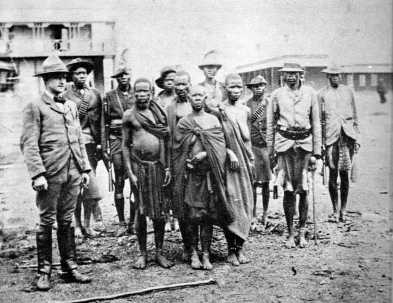PachiShona “tsika” means two things. As with many Shona words, depending on context and how you pronounce it, it can mean, “to trample, tread or step on,” and in the very same breath it can mean “manners, moral conventions and/or good behaviour.” My choice of title is intentional in its double meaning and irony. Whether I mean, “trample on morality” or “manners are manners,” is for you to decide… I have learnt from the many Zimbabwean journalists and sub-editors who, possibly with their tongues firmly in their cheeks, write of probing and fingering much to the dismay of Mills & Boon fanatics and to loud tongue-clicking and vigorous headshaking (albeit all for different reasons!)
As a third culture kid, my “Zimbaweanising” journey has met many speed bumps. The biggest of these is my constant interrogation and often full frontal (I swear I’m not vying for a job at the Daily News!) attack of the Zimbabwean stance on morality and the out-in-the-public conservatism of Zimbabwean society. Coupled with my rabidly anti-patriarchal stance, it’s no wonder many of my relatives look at me as the wayward one, the one asina tsika (without manners). After all, I address men as if they were my equals, I question the subjugation of women in customs, I vehemently reject the modern manifestation of polygamy and I chortle when I hear that a Christian rapper performed at the première of “50 Shades of Grey” in Harare. And at my tender age, unmarried!
According to many in Zimbabwe, I also don’t dress appropriately. My skirts don’t dust the ground I walk on, I only wear headwraps as a fashion statement and only when Iwant, I bare my arms and I like the contour of my not-so-skinny body in skinny jeans. Those offending contours and curves!
My refusal to conform to certain conventions notwithstanding, I am a respectful Zimbabwean. I carry myself in a dignified manner, respect my elders and my peers and, apart from a side eye I struggle to control, I express myself as society expects. Or so you’d think!
Nevertheless, as I reflect, I am reminded of the day I was reprimanded by an old woman at my grandmother’s funeral for wearing black slacks. This woman, whose face I can no longer remember and whose name (and unsolicited advice) I never asked for, approached me to say it would be “disrespectful” of me to go anywhere near my grandmother’s coffin and grave “dressed like that.”
I scoffed.
There she was in her heavy polycotton frock deep in Chivi South (surely Mbuya Nehanda didn’t wear a long pleated skirt and a heavy blouse under the scorching Zimbabwean sun?) telling me that I was not dressed Victorian enough for mygrandmother’s funeral.
On that day, I trampled on her view of manners and in her mind I was dancing on my grandmother’s grave. I wasn’t. I wouldn’t. But I digress…
I write of ironies and paradoxes, I write of Zimbabwe
 Societies, through culture and socialisation, shape how people dress, how we must speak (especially women), how we must conduct ourselves around others, and what we can and cannot find acceptable. Put simply, society makes the man. The man makes society. But all too often, people break away from the mold and seek an identity apart from their society: whether within or without. It is this deviation that can sometimes contribute to the evolution of a society. What were once norms become abrogated by disuse or lack of necessity and are replaced with new conventions. That is the natural order of things. Yet, as I reflect on the (d)evolution of Zimbabwean society, I see little change. At least recently. I imagine the rules we live by – perhaps many of our own creation, but others designed for us – were entrenched over a century ago and because they are convenient for patriarchy and misogyny, they remain.
Societies, through culture and socialisation, shape how people dress, how we must speak (especially women), how we must conduct ourselves around others, and what we can and cannot find acceptable. Put simply, society makes the man. The man makes society. But all too often, people break away from the mold and seek an identity apart from their society: whether within or without. It is this deviation that can sometimes contribute to the evolution of a society. What were once norms become abrogated by disuse or lack of necessity and are replaced with new conventions. That is the natural order of things. Yet, as I reflect on the (d)evolution of Zimbabwean society, I see little change. At least recently. I imagine the rules we live by – perhaps many of our own creation, but others designed for us – were entrenched over a century ago and because they are convenient for patriarchy and misogyny, they remain.
One need only read the stories in our dailies to see how tsika is defined and evaluated in Zimbabwean society today.
- A woman in a short dress gets attacked for “dressing like a whore”
 in a society that polices what women should wear while leaving the oversize viscose clad men to carry on with their fashion crimes. (In the same week, The Herald asks people if wearing a mini-skirt makes you a prostitute and my eyes roll back to 1986…)
in a society that polices what women should wear while leaving the oversize viscose clad men to carry on with their fashion crimes. (In the same week, The Herald asks people if wearing a mini-skirt makes you a prostitute and my eyes roll back to 1986…)
- A child raped by her uncle quietly becomes his wife.
- A man kissing a man is big and deplorable news in a society that vehemently rejects homosexuality and thus all forms of intimacy between people of the same sex – especially if they are men.
- A daughter is “damaged” and brings shame to her family for falling pregnant out of wedlock, but her sperm donor is reminded that virility makes the man.
- You will watch Korean shorts on ZTV because those bloody westerners always have sex in their shows and ours is a society that speaks, sees and hears no sexual evil… yet you will get lambasted by your aunts for your man cheating on you because “what kind of woman can’t please her man?”
- Your morality is quickly assessed by complete strangers based on what you wear and how low you bow or kneel when you greet your elders – especially the male ones.
The mind boggles. It’s 1896 in 2015.
I often wonder if the pervasive (if not outright offensive) breed of Zimbabwean puritanism is of our own making or if it has been influenced by the conservatism of 19th century christianity. The more I wonder, the more I lean to the latter.
There is great irony in a people who pride themselves in being free from the yoke of settler colonialism clinging so fervently to what is so clearly Victorian puritanism. We have burnt our nhembe neshashiko (loincloths) and regard them as backward. Dare a woman in a short anything walk the streets of faux-cosmopolitan Harare! We are a people who will proudly tell you we have no traditional dress as we walk around with our student companion-taught perfectionism in our polyester long everythings fresh from China.
Tell me you don’t question your own conservatism sometimes. That you don’t wonder what your forebears used to wear. That you’ve never pondered how a woman likeNehanda Charwe Nyakasikana could possibly have been the leader and guide of our revolution if our society was so deeply patriarchal. Tell me that you never wonder whether your definition of indecency was not flung by others on people before you to rid them of their identity. The savages!
A loincloth is Haram.
Barebreasts are primitive.
Yet there many of you were with fully charged batteries taking photos and videos of young women crawl in what I assume they hoped would be a seductive and/or sexy way for their supper. I assume conservatism goes to sleep at 18.59.
As the world evolves, somewhere between the Limpopo and Zambezi (and elsewhere on the continent of course) are a people stuck in 1896 Britain while screaming sovereignty and all sorts of catchy phrases like “We shall never be a colony again!” For what’s left to colonise when you have succeeded in colonising the minds? Of making strapping 19th century Brits out of the Africans whose languages and customs you systematically sought to eradicate. And where eradication failed, succeeded in making them seem inferior or moulded them just so. What’s left to colonise?
Before some assume that I am only preaching to the deep-in-the-roots choir, I am not. In shaping our society, we must strike a balance between that which sets us apart as Zimbabweans, while engaging critically in an increasingly globalised world with a unique culture.

For, as we all know too well, the “modernists” among us will say, “Lobola is too outdated and expensive… Lets have a lavish WHITE wedding rather!” without a hint of irony. Elsewhere, others will chant, “Let’s go to church and cure ourselves of these beliefs in ancestral spirits and their ability to communicate with us.” “Lets pray to resurrected zombies and deities instead.”
My plea is not to reject tsika entirely. Far from! I have highlighted some aspects that I find problematic, but know and appreciate that tsika and hunhu form cornerstones of our society. Mindful of this critical space that tsika occupies it is imperative that we redefine it constructively. We must not lose who we are, but we must also not allow who we are to be defined in strict unrelenting terms.
We are the custodians of our culture.
It is ours to build and keep.
••• •••
The biggest irony of all is I wrote this piece with the ease with which the language of a far away place rolls off my light tongue. I wrote this piece in English, because as I lament my peoples and their customs, the language that I can best express myself in remains the language used to oppress them.
PS: I only put “fingering” in the title because it always makes for a catchy eye-raising title. Chete chete.
••• •••
Ottilia Anna Maunganidze
[Originally written for and posted on the Conversation Zimbabwe website.]



No comments:
Post a Comment